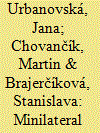| Srl | Item |
| 1 |
ID:
079719


|
|
|
|
|
| Publication |
2007.
|
| Summary/Abstract |
The article examines the factors that led to the establishment and evolution of the minilateral cooperation among France, Germany, the United Kingdom (and eventually the High Representative for CFSP) vis-à-vis Iran. The analysis brings together two theoretical approaches, institutional design and role theory. It posits that minilateral cooperation in the Iranian case and security affairs in general do not easily translate into multilateral cooperation. It finds that in contrast to the trade and economic realm, the course of security minilaterals is strongly shaped by rivalling formal institutions, specific characteristics in the non-proliferation regime (lack of specificity in central norms) and the role behaviour of the United States. European minilateral cooperation started (as in the case of the Middle East Quartet and Six-Party Talks) when the US rejected bilateral engagement. The initiative successfully mediated a temporary suspension of Iran's enrichment activities as long as Tehran believed that the EU-3 could bring the US to the table and commit the Bush Administration to a comprehensive negotiated settlement, including US security guarantees. Since the EU-3 and the subsequent P-5 (the permanent five members of the UNSC) plus Germany/EU High Representative for CFSP minilaterals have been incapable of forming a resilient transatlantic coalition of policy makers to negotiate a comprehensive settlement, another serious split could occur if Washington pursues a punitive course without having fully supported a cooperative solution to the crisis
|
|
|
|
|
|
|
|
|
|
|
|
|
|
|
|
| 2 |
ID:
183976


|
|
|
|
|
| Summary/Abstract |
Post-Brexit referendum EU Common Security and Defence Policy (CSDP) developments have called for an enhancement of Germany’s leadership in the CSDP. Given fears of German dominance, its self-limitation and diverging French visions, Germany is steered towards building deeper alliances and partnerships. Minilateral cooperation offers unique benefits to the current German leadership dilemma yet remains understudied outside of Western defence cooperation. Based on three representative areas of the CSDP, the article examines the progress and viability of minilateral CSDP cooperation between Germany and Visegrád countries and finds clear indications of growing post-2016 minilateral cooperation with this particular region.
|
|
|
|
|
|
|
|
|
|
|
|
|
|
|
|